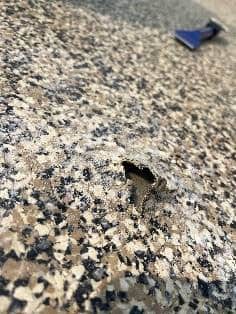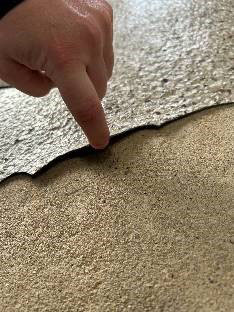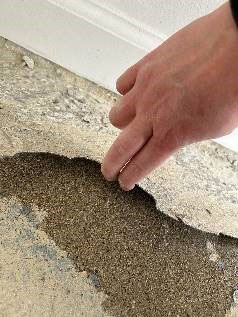Polyurea & Polyaspartic
The pitfalls of 1-Day Polyurea-Polyaspartic Garage Floor Coatings
Polyureas (and polyaspartics) are quick-cure coatings and begin curing the moment they come in contact with the concrete. Under normal ambient conditions, curing can occur in an hour or less. However, in the presence of moisture in the concrete or on rather humid days, polyurea-polyaspartics, paradoxically, cure faster still. This is one reason why application of these coatings is best left with professionals, who have perfected speedy application with rollers or squeegees.
It is also the reason why polyurea-polyaspartic are, frequently, not the best choice as direct-to-concrete primers. Their quick-cure property, which is very much amplified in the presence of moisture, doesn’t allow for proper penetration into the porous concrete.
What potential issues could arise when applying polyurea garage coating?
Polyurea coatings, like all coating types – epoxies, polyurethanes or polyurea-polyaspartics – have their benefits and disadvantages. Quality polyureas and polyaspartics (a polyaspartic is simply an aliphatic polyurea) are excellent “quick-cure” coatings that can provide extreme UV, chemical, stain and impact resistance.
However, polyureas do have an Achilles heel (as all coatings do). These quick-curing coatings poorly adhere to concrete in the presence of moisture, so they are questionable as “direct-to-concrete” primer coats. It is somewhat of a paradox, but quick-cure polyurea-polyaspartic coatings cure faster still in the presence of concrete moisture (or humidity in the air). And it is precisely the enhanced curing speed in the presence of moisture, of an already fast-curing polyurea, that prevents these coatings from deeply penetrating porous concrete.
When applied as primers in the presence of medium to high concrete moisture, a thin, poorly penetrating polyurea primer layer has a propensity to peel as hydrostatic (moisture) pressures build over time. (This is why “1-day polyurea” applicators add warranty exclusions to “moisture-related issues”, “hydrostatic pressure”, “moisture vapor transmission”…because they have to!).
What questions should a homeowner ask before hiring a contractor?
Aside from the standard question: “Are you licensed, bonded and insured?”, the most important question a homeowner should ask before hiring a contractor pertains to the warranty of the installed coating (or more specifically, the warranty exclusions).
In our experience, many coating contractors offer a “lifetime warranty”, “limited warranty” or long warranty (15 – 20 years) for full-flake, residential garage floor coatings. However, many add warranty exclusions for “moisture-related issues”, “hydrostatic pressure”, “moisture vapor transmission” and even hot tire markings and staining. Because these issues represent the most common reasons for coating system failures, excluding them effectually negates the warranty. (We call them “sleight-of-hand” warranties). If bubbling, peeling or staining occurs, the contractor simply invokes the applicable “warranty exclusion” and the customer is left hanging.
More than anything else, it is the warranty exclusions that show the contractor’s hand. For this reason, customers must ask each bidding contractor to clearly show their warranty exclusions. If the contractor is confident in their coating products and installation process, “moisture-related issues” and staining should be fully covered, whatever the warranty duration is.
Is there a benefit to hiring a professional?
No doubt in our minds. A large percentage of our jobs are DIY and “1-day polyurea” redo’s. The coatings and equipment needed to do the job properly are commercial-grade and more expensive than DIY counterparts. Non-professionals typically don’t have access to commercial equipment and (despite DIY instructions) a simple acid-wash won’t create a good concrete profile. Additionally, DIY coatings don’t provide the same durability as commercial-grade coatings.
Also, based on the concrete moisture assessment, an array of coating types must be at the installer’s disposal. For moisture readings of 1 and above, a moisture-mitigating epoxy should be applied as the primer coat – not a polyurea (it’s the polyurea’s speedy cure rate in the presence of moisture that degrades its ability to properly penetrate the porous concrete). Professional installers have an array of coatings at their disposal and can use the right products for the unique concrete space – DIY applicators typically don’t.
Backing Our Promise
At Garden State Garage Floor Coating, we stand behind our products and installation process with an industry-leading warranty covering all moisture-related issues and staining from automotive fluids and hot-tire transfer. Our unwavering commitment to excellence and customer satisfaction ensures that your garage floor investment is safeguarded.
While 1-day polyaspartic and polyurea coatings offer quick installation, they come with significant risks. We prioritize quality over speed, offering a superior solution through our proven Moisture Vapor Barrier system. Choose Garden State Garage Floor Coating for a garage floor coating that truly stands the test of time.



